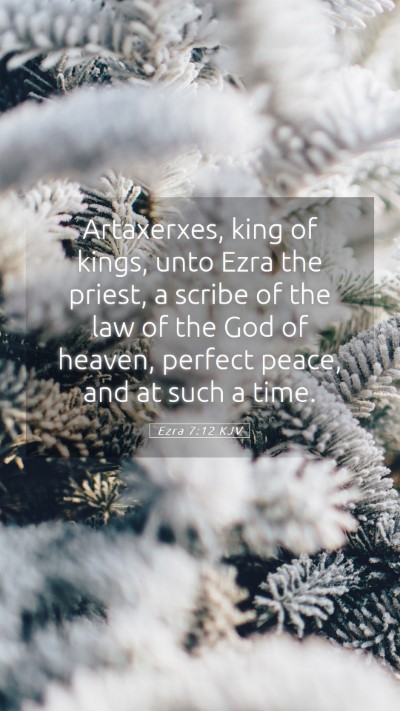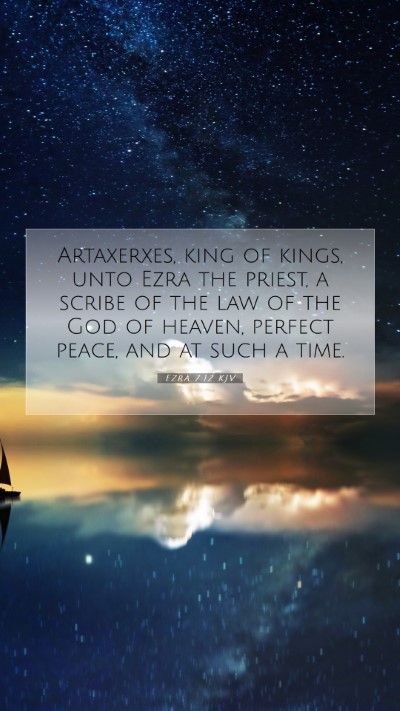Old Testament
Genesis Exodus Leviticus Numbers Deuteronomy Joshua Judges Ruth 1 Samuel 2 Samuel 1 Kings 2 Kings 1 Chronicles 2 Chronicles Ezra Nehemiah Esther Job Psalms Proverbs Ecclesiastes Song of Solomon Isaiah Jeremiah Lamentations Ezekiel Daniel Hosea Joel Amos Obadiah Jonah Micah Nahum Habakkuk Zephaniah Haggai Zechariah MalachiEzra 7:12 Meaning
What is the meaning of Ezra 7:12?
Artaxerxes, king of kings, unto Ezra the priest, a scribe of the law of the God of heaven, perfect peace, and at such a time.
Ezra 7:12 Bible Verse Meaning
Understanding Ezra 7:12
Ezra 7:12 states, "Artaxerxes, king of kings, to Ezra the priest, a scribe of the law of the God of heaven, perfect peace." This verse serves as a significant introduction to Ezra's mission and role in restoring the religious life of the Jewish people after their return from Babylonian captivity.
Bible Verse Meaning
This verse is pivotal in understanding the historical context of Ezra's leadership. It introduces Ezra as a dedicated priest and scribe, highlighting both his spiritual authority and knowledge of God's law. The title "king of kings" attributed to Artaxerxes serves to assert the political power and influence extending over many nations, emphasizing the importance of Ezra's tasks under such a significant ruler.
Commentary Insights
-
Matthew Henry:
Henry emphasizes that Ezra was well-prepared for his mission by God. He was not only learned in the law but also had the heart to see it effectively implemented among the people. Ezra's ability to lead was complemented by the king's acknowledgement of his role, which provided credibility and support for his endeavors.
-
Albert Barnes:
Barnes points out that the phrase "to Ezra the priest, a scribe of the law" indicates Ezra's dual role as both a minister and teacher. His expertise in the law underscores the need for proper instruction for the returning exiles to rebuild their identity and covenant relationship with God.
-
Adam Clarke:
Clarke highlights the significance of the "perfect peace" greeting. He interprets this as a formal salutation that conveys the king's goodwill towards Ezra, suggesting a supportive environment for Ezra's task of teaching and reforming the Jewish community.
Significance and Application of the Verse
Understanding Ezra 7:12 allows us to recognize the importance of leadership that combines spiritual knowledge with authority. The support from secular leaders, as seen with Artaxerxes, showcases the potential for cooperation between sacred and secular entities, which is vital in any community seeking revival or reformation.
Application to Daily Life
For modern readers, this verse illustrates the necessity of having knowledgeable leaders who can impart wisdom derived from Scripture. In Bible study groups, it becomes crucial to encourage leaders who embody these qualities to facilitate deeper understanding of Scripture among participants, whether through online Bible study platforms or community gatherings.
Cross References
- Nehemiah 8:1-12: The public reading of the law and the people's response to it emphasizes the reverence for God's Word that Ezra cultivated.
- Ezra 10:3: Discusses a covenant commitment made by the people, showing the transformation that resulted from Ezra's teaching.
- Malachi 2:7: Highlights the role of priests to seek knowledge of the law and teach it to the people, reinforcing Ezra's function.
In-depth Exegesis
This verse, as part of the larger narrative in Ezra and Nehemiah, embodies key components of restoration and reverence towards God’s law post-exile. The historical context, along with Ezra's qualifications, guides followers in understanding Scripture and applying its principles to their lives.
Final Thoughts
Ultimately, Ezra 7:12 sets the stage for profound transformation through the law and leadership. As believers engage in Bible study resources and tools, they can extract deeper meanings from passages like this, applying lessons learned to their spiritual journeys and communal church life.


